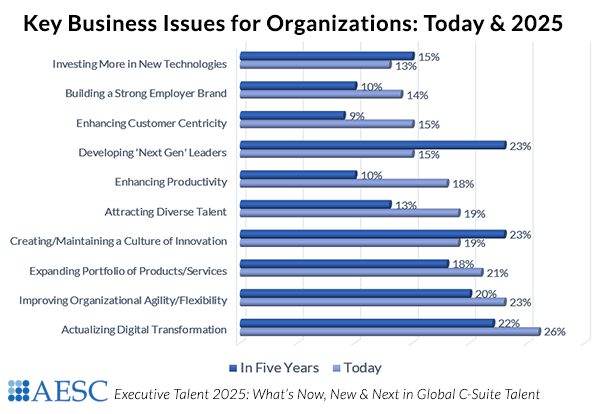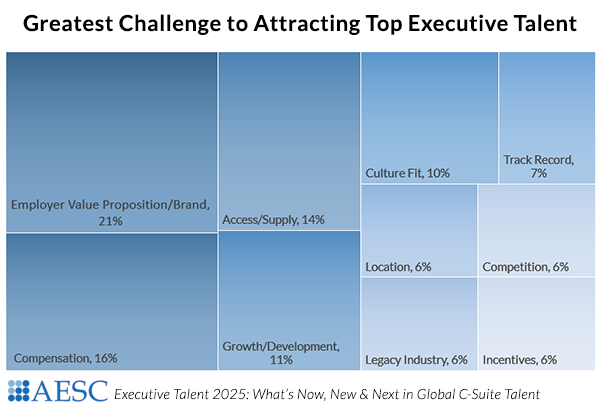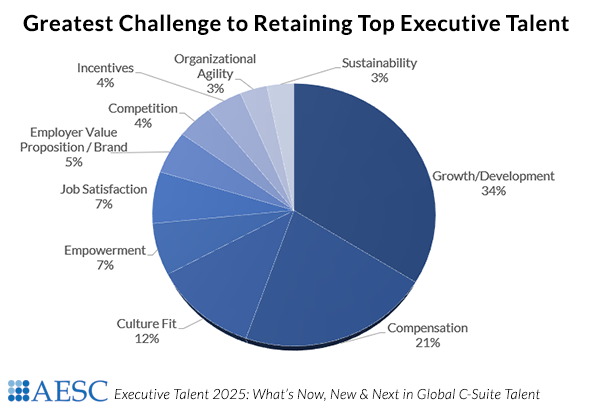Insights
Executive Talent 2025: Business Intelligence for Tomorrow’s Leaders
Much is said of the complexities facing workforces today. C-Suite executives and Boards of Directors are balancing the latest technological advancements – from AI to RPA – while working to meet the varying needs of a 5-generation workforce. They are also increasingly driving innovation with new products and services in order to respond to a customer-centric marketplace. The competitive business landscape of today requires leaders to remain agile. But how does this translate to actionable strategies and tactics that executives can tackle today?
We sought to understand how executives and boards of directors can transform today’s complex challenges into opportunities. Building off the framework of our Executive Talent 2020 report, we surveyed 2,000+ clients, candidates and AESC Members for Executive Talent 2025. The report offers a roadmap of how business leaders can address top business challenges today and by 2025 as well as how external advisors can better serve them. Business leaders recognize the important role external advisors play in laying the groundwork to achieve long-term success and they outline how they currently use external advisors and how they plan to use them in the future.
Key Business Issues
Business leaders identified ‘actualizing digital transformation’ at the top of the list of today’s issues. In AESC’s Leading Transformation: Shaping the C-Suite for Business 4.0 Innovation, we found that C-Suite leaders strive to actualize digital transformation across their enterprises, but it does not come easy. Industry 4.0 technologies have created a ‘Business 4.0 environment’ which is fundamentally different than that of the past.

Organizations are revisiting their business models and racing to tap into disruptive technologies to better serve their customers, and in the process, expand their portfolios of products and services. The new world of global business requires new traits and competencies of leaders and demands a different type of culture where innovation can flourish. Digital is driving demand for both agile leaders and agile organizations, increasing focus on developing next generation leaders, and fueling a critical need for diversity in the C-Suite and at Board level. With a tremendous new demand on talent, there are win-win opportunities for increased partnership between business leaders and executive talent advisors.
Top Concerns in the Boardroom
For Boards of Directors, the top issues today are all focused on core governance including ethics, governance standards and strategy oversight. However, looking to the next five years, the issues become much more strategic in nature, and include creating a more diverse board. For 2025, boards are prioritizing M&A, long-term value creation and board recruitment. C-Suite leaders understand that their boards must have a robust board recruitment strategy to attract the diverse board talent they need and with the right skillset, which increasingly includes marketing, technology and even cybersecurity, in addition to the more traditional management and finance skillsets of directors.
The Critical Role of an Employer Brand

In their own words, business leaders surfaced ‘employer value proposition/brand’ as a key challenge to attracting top executive talent. In a candidate market like today’s where the competition for top talent is fierce and where candidates often have many options, it is critical for organizations to have strong employer brands to attract the talent they need.
Retaining talent is also a top concern of today’s organizations. Business leaders chose being able to offer enough ‘growth/development’ to their employees as the main challenge in keeping talent, above compensation, the #2 retention challenge. Key in both attraction and retention is a deep understanding of culture and how it translates into having an authentic employment brand – not just in words and images but in overall work environment. Understanding culture and how it can drive attraction, retention and innovation is a critical opportunity for business leaders to leverage the services of external advisors.
Executive Talent Solutions
In addition to talent acquisition, organizations today are seeking guidance from external providers on services that include executive pay, leadership development, and leadership assessment.
Over the next five years, there is a clear trend – business leaders have identified an increased openness to working with their executive search consulting firms on a broad range of leadership advisory services. In five years, business leaders identified succession planning, leadership effectiveness and organizational effectiveness as their top three areas for using an outside advisor. Business leaders are choosing executive search firms for the strategic value they bring to their businesses, choosing executive search firms as their preferred provider for seven out of nine scenarios, including:
- Base salary $300k+ USD
- C-Suite positions
- Confidential search
- Base salary $200-299k USD
- Hard-to-fill positions
- Board recruitment
- Cross border search
Organizations select a consultant’s industry/functional knowledge’ (53%) and the ‘consultant’s reputation’ (41%) as the most important factors when selecting an executive search firm. More than a third of business leaders (34%) rated a ‘trusted advisor relationship’ as the #4 reason they choose to partner with a specific search firm for their assignments. This shows the importance of executive search as a consulting business with the advisory provided being the value that business leaders seek.
SOLUTIONS
AESC Members partner with organizations worldwide to provide solutions for their most critical leadership challenges. CEOs, CHROs and Board Directors are invited to register for an account to access AESC’s Global Directory. Connect with a consultant now >

